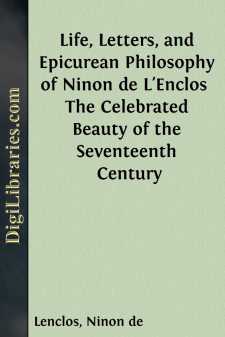Categories
- Antiques & Collectibles 13
- Architecture 36
- Art 48
- Bibles 22
- Biography & Autobiography 813
- Body, Mind & Spirit 142
- Business & Economics 28
- Children's Books 15
- Children's Fiction 12
- Computers 4
- Cooking 94
- Crafts & Hobbies 4
- Drama 346
- Education 46
- Family & Relationships 57
- Fiction 11828
- Games 19
- Gardening 17
- Health & Fitness 34
- History 1377
- House & Home 1
- Humor 147
- Juvenile Fiction 1873
- Juvenile Nonfiction 202
- Language Arts & Disciplines 88
- Law 16
- Literary Collections 686
- Literary Criticism 179
- Mathematics 13
- Medical 41
- Music 40
- Nature 179
- Non-Classifiable 1768
- Performing Arts 7
- Periodicals 1453
- Philosophy 64
- Photography 2
- Poetry 896
- Political Science 203
- Psychology 42
- Reference 154
- Religion 513
- Science 126
- Self-Help 84
- Social Science 81
- Sports & Recreation 34
- Study Aids 3
- Technology & Engineering 59
- Transportation 23
- Travel 463
- True Crime 29
Life, Letters, and Epicurean Philosophy of Ninon de L'Enclos The Celebrated Beauty of the Seventeenth Century
by: Ninon de Lenclos
Categories:
Description:
Excerpt
CHAPTER I
Ninon de l'Enclos as a Standard
To write the biography of so remarkable a woman as Ninon de l'Enclos is to incur the animadversions of those who stand upon the dogma, that whoso violates one of the Ten Commandments is guilty of violating them all, particularly when one of the ten is conventionally selected as the essential precept and the most important to be observed. It is purely a matter of predilection or fancy, perhaps training and environment may have something to do with it, though judgment is wanting, but many will have it so, and hence, they arrive at the opinion that the end of the controversy has been reached.
Fortunately for the common sense of mankind, there are others who repudiate this rigid rule and excuse for human conduct; who refuse to accept as a pattern of morality, the Sabbath breaker, tyrant, oppressor of the poor, the grasping money maker, or charity monger, even though his personal chastity may entitle him to canonization. These insist that although Ninon de l'Enclos may have persistently transgressed one of the precepts of the Decalogue, she is entitled to great consideration because of her faithful observance of the others, not only in their letter but in their spirit, and that her life contains much that is serviceable to humanity, in many more ways than if she had studiously preserved her personal purity to the sacrifice of other qualities, which are of as equal importance as virtues, and as essential to be observed.
Another difficulty in the way of establishing her as a model of any kind, on account of her deliberate violations of the sixth precept of the Decalogue, is the fact that she was not of noble birth, held no official position in the government of France, either during the regency or under the reign of Louis XIII, but was a private person, retiring in her habits, faithful in her liaisons and friendships, delicate and refined in her manners and conversations, and eagerly sought for her wisdom, philosophy, and intellectual ability.
Had she been a Semiramis, a Messalina, an Agrippina, a Catherine II, or even a Lady Hamilton, the glamor of her exalted political position might have covered up a multitude of gross, vulgar practices, cruelties, barbarities, oppressions, crimes, and acts of misgovernment, and have concealed her spiritual deformity beneath the grandeur of her splendid public vices and irregularities. The mantle of royalty and nobility, like dipsomania, excuses a multitude of sins, hypocrisy, and injustice, and inclines the world to overlook, disregard, or even condone, what in them is considered small vices, eccentricities of genius, but which in a private person are magnified into mountains of viciousness, and call forth an army of well meaning but inconsistent people to reform them by brute force.
It is time to interpose an impasse to the further spread of this misapprehension of the nature and consequences of human acts, and to demonstrate the possibility, in humble walks of life, of virtues worth cultivating, and to erect models out of those who, while they may be derelict in their ethical duties, are still worthy of being imitated in other respects....


